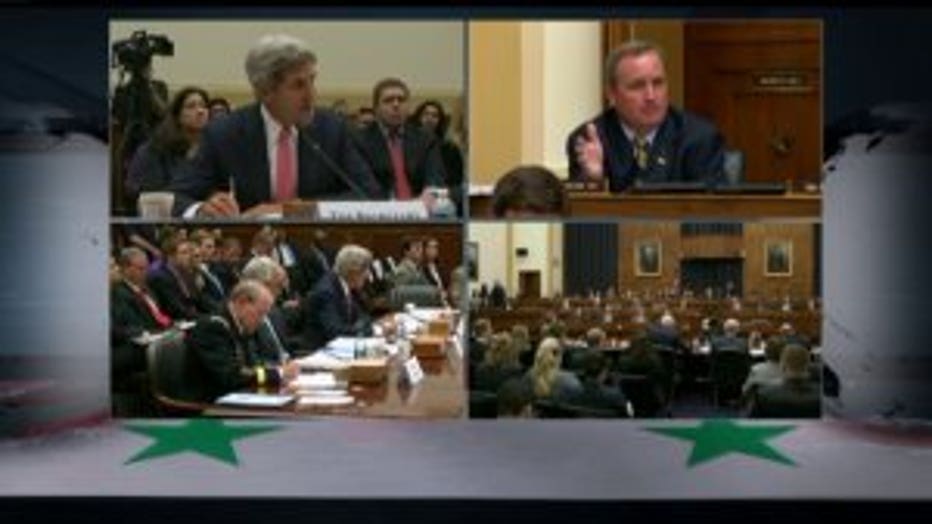Senate panel backs U.S. strike on Syria; House support up in air
By Paul Richter, Michael A. Memoli
and Kathleen Hennessey
Los Angeles Times
WASHINGTON — The Senate took a crucial step Wednesday toward authorizing a punitive strike on Syria but deep reluctance was evident in the House, where lawmakers questioned whether the United States was in danger of being drawn into another Middle East war.

President Obama, who announced Saturday that he would seek legislative backing for military action in response to Syria's alleged use of chemical weapons, sought to raise the pressure on Congress as well as U.S. allies, warning that their reputations were at stake.
"My credibility's not on the line. The international community's credibility's on the line. And America and Congress' credibility's on the line," Obama said during a visit to Stockholm.
Administration officials have repeatedly compared Syrian President Bashar Assad to Saddam Hussein and Adolf Hitler, and said he needs to be deterred from using chemical weapons again.
On a 10-7 vote, the Senate Foreign Relations Committee approved a resolution Wednesday to authorize U.S. missile strikes. The committee chairman, Sen. Robert Menendez , D-N.J., said Congress should "make sure Assad understands he can't just wait us out, use chemical weapons and face no consequences."
Several senators from both parties, including opponents of the resolution, predicted the Senate would approve it next week. Yet the Senate's conflicted views were clear in the vote, which saw Democrats and Republicans on each side. Menendez and Sen. John McCain, R-Ariz., supported the resolution, while conservative Sen. Marco Rubio, R-Fla., voted with liberal Tom Udall, D-N.M., against it.
Serious doubts on U.S. military action were aired in a hearing in the House Foreign Affairs Committee. Rep. Gregory Meeks, D-N.Y., and other lawmakers repeatedly asked about the risks of U.S. involvement in Syria's civil war, while Rep. Michael McCaul, R-Texas, questioned why the United States should side with Syrian rebels when "radical Islamists" make up most of their forces.
Obama, meanwhile, insisted he was not alone in demanding a response to the alleged use of chemical weapons in the suburbs of Damascus on Aug. 21, but was joined by nations that signed treaties banning chemical weapons and by Congress, which ratified them. "I didn't set a red line; the world set a red line" he said. "That wasn't something I just kind of made up."
The Senate committee's resolution limits any U.S. mission to 90 days and prohibits the use of ground troops.
The resolution was amended to include language from McCain and Sen. Chris Coons, D-Del., directing that the strike be used to "change the momentum on the battlefield" away from the Syrian government, which has had the edge for much of this year. The amendment said that it was necessary to pressure Assad to negotiate an end to the war.
Supporters hope that language will capture the votes of centrist lawmakers, as well as hawks. But it could drive away antiwar Democrats and anti-interventionist Republicans in the House, who have been insisting the strikes should not pull the United States deeper into another war.
The difficulty of winning votes in the House — particularly among majority Republicans — was clear at the Foreign Affairs Committee hearing. Secretary of State John F. Kerry, Defense Secretary Chuck Hagel and Gen. Martin Dempsey, chairman of the Joint Chiefs of Staff, faced mostly skeptical questions about their confidence in the intelligence about the use of chemical weapons, the nature of the Syrian opposition and the consequences of a strike.
The panel's chairman, Rep. Ed Royce, R-Calif., said the administration's Syria policy "doesn't build confidence" and that the House would make its own revisions to the authorization resolution.
In one combative exchange, Rep. Jeff Duncan, R-S.C., questioned why the administration had abandoned its caution on military action in Syria and was "pulling the trigger on a military response so quickly." The administration, he said, has a credibility issue with the public "due to the unanswered questions surrounding the terrorist attack in Benghazi," a reference to the attack on a U.S. diplomatic facility in that Libyan city last Sept. 11 that killed four Americans, including the ambassador.
"Let's draw the proper distinction here," Kerry sternly responded. "We don't deserve to drag this into yet another Benghazi discussion when the real issue here is whether or not the Congress is going to stand up for international norms with respect to dictators that have only been broken twice until Assad: Hitler and Saddam Hussein. And if we give license to somebody to continue that, shame on us."
Strong statements in support of a resolution came from Reps. Tom Cotton, R-Ark., and Adam Kinzinger, R-Ill., both of whom served in the military. Kinzinger displayed a photo of Syrian children to warn about the risk of further inaction.
"The day the United States does not act is not just the day that Bashar al Assad knows it's open season for chemical weapons, but also the day Kim Jong Un knows that and, most ominously, the day that Iran's supreme leader, Ayatollah Khamenei, spins his centrifuges into overdrive," Cotton said.
In an interview, Kinzinger estimated there was only a 40% chance the House would pass a resolution, "maybe 50 if we're lucky."
Given the divide among Republicans, White House lobbying efforts appear to be centered on Democrats. Administration officials held separate phone briefings with the Congressional Hispanic Caucus and the Progressive Caucus. House Minority Leader Nancy Pelosi, D-Calif., sent a letter to Democrats seeking "further suggestions or ideas you may have as to what you can support" in a resolution.
Dempsey acknowledged that the risk of escalation can never be ruled out entirely. The military intends to limit U.S. involvement "in time and commitment," he said. "That's not to say I discount the risk of escalation, which I can never discount. But we've mitigated it as much as possible."

